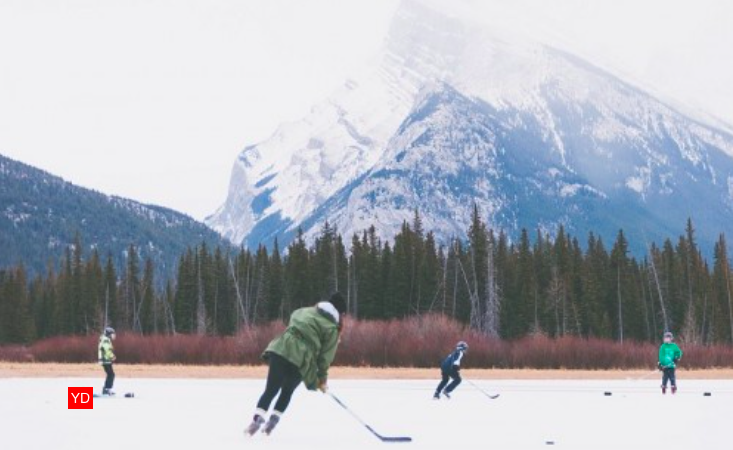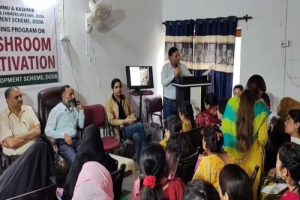The country’s highest open air ice hockey rink, developed recently amidst the stunning backdrop of the mighty Himalayas at an altitude of 3,720 metres in the picturesque but rugged Kaza, a cold desert town in Himachal Pradesh’s Spiti Valley, has turned into a nursery for the players.
In less than two years, Spiti Valley, the paradise that straddles both India and Tibet comprising over two dozen small and scattered villages, has earned its name in ice hockey through the Women Ice Hockey National Championship scheduled from January 16-20.
The passion of locals, mostly youngsters, for the game is unquestionable as they miss no opportunity in getting their skates to hit the ice.
Over 400 skaters enjoy their run at the rink every day. Skater Dolma Negi, a Class X student, said: “We are excited about participating in the advanced basic training camp. One day we will definitely get an opportunity to represent the state in a national tournament.”
The ice hockey rink — the highest in the country as Kaza is located at an altitude higher than Leh — of 60 metre by 30 metre size, exactly the international standard size, has been developed by giving a natural coating of thick layers of ice.
Authorities sprinkle water on the clay ground of the open air rink which freezes under natural conditions in the night. If the sky is cloudy, the minimum temperature normally rises, resulting in thawing of the ice.
The congenial average minimum temperature for ice formation ranges from minus 10 to 15 degrees Celsius.
This season some 400-odd skaters belonging largely to the Spiti Valley, most of whom are in their 20s, have been registered for basic and advanced basic training camps, a rise in number from last year’s 223 participants, said organisers.
They are being trained by India Ice Hockey Association national coaches Amit Belwal and Noor Jahan, who was awarded Asia’s best goaltender in the 2016 IIHF Challenge Cup.
Seeing the local potential, facility and congenial climatic conditions, the Ice Hockey Association of India is currently holding a national development camp for 80 players in the run-up to the national championship that will see the participation of teams from the Indo-Tibetan Border Police, Telangana, Leh and Himachal Pradesh, among others.
Officials told IANS the ice hockey has been an integral part of Spiti for decades.
In 2019 when the first proper ice rink was set up by the District Youth Services and Sports Department, most of the players got an opportunity to hone their skills in a two-and-a-half-month sport.
“Initially most of the players borrowed skates and a hockey stick from one another despite the government making provision for them. Now they are not complaining as a majority of them have their own equipment,” said an official, adding “a new power in India’s ice hockey is emerging in the Himalayas, the second destination after Ladakh”.
With dreams of playing in the Winter Olympics, local lads are excited.
Athlete Tenzin Dolma dreams of representing the country internationally.
“Lack of proper equipment was earlier the deterrent in pursuing the sport professionally. Normally we used to take to hand-crafted wooden planks on frozen fields at an early age as the art of skating is passed on from one generation to another.
“Now with these coaching programmes, competitive skating has been acquiring a new meaning and with this most of us are aiming to represent the country,” she added.
Coach Noor Jahan told IANS that the girls here have a strong passion and will to learn the game. “They are from scores of villages situated in the suburbs of Kaza town. Their passion to learn is bringing most of them well ahead of the start of the practice session at 9 a.m. You can find some of the players as early as 6 a.m.”
From November to March, the area is piled with snow and children here have no option but to take to winter sports. “For them, skating blades are like any other toy,” the coach added.
Olympian Skalzang Dorje, an instructor with the Youth Services and Sports Department, said Spiti Valley has a huge potential for winter sports with many slopes.
“A youngster normally picks up a skate blade early. Now you can find high-end ski blades and skates, besides modern attire in every house,” said Dorje, who competed in the men’s archery individual and team events in the 1996 Summer Olympics.
The concept of the natural hockey rink evolved in Kaza, some 350 km from the state capital, from the skating rink in Shimla that was developed by an Irish military official named Blessington who lived during the British Raj.
The military official had inadvertently kept a bucket of water outside his residence and in the morning found it frozen. That gave him the idea of a skating rink and he created a small one of his own.

























Add Comment